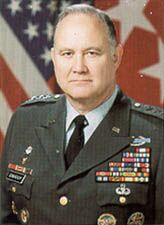

(1934- ) American General As the commander of the U.S. Central Command, H. Norman Schwarzkopf led the coalition forces that defeated Iraq and liberated Kuwait in Operation Desert Shield/Storm (1990-91). Schwarzkopf's leadership in producing a decidedly one-sided victory and his adept handling of the world media made him the best-known and most popular American general since World War II. He also represents those dedicated U.S. Army officers who fought the long and unpopular Vietnam War and remained in the service to restore the combat capability and integrity of their service. Schwarzkopf was born on August 22, 1934, in Trenton, New Jersey, the son of a West Point graduate who made a career in the state police and the U.S. Army reserves. The senior Schwarzkopf was recalled to active duty during World War II. The younger Schwarzkopf first experienced the Mideast when he visited his father, then a military adviser to the shah of Iran, after the war. Schwarzkopf attended Valley Forge Military Academy before his acceptance into the West Point class of 1956. Upon graduation and with a commission in the infantry, he served in troop assignments in the United States and Germany. After attending the University of Southern California for two years and earning a master's degree in guided-missile engineering, Schwarzkopf returned to West Point as a member of the faculty. Following a year at the academy, Schwarzkopf requested reassignment to Vietnam, where he served as an adviser to a Vietnamese airborne division. During his tour he earned several valor decorations and the Purple Heart. Schwarzkopf served on the West Point faculty for two years, attended the Army Command and General Staff College, gained an early promotion to lieutenant colonel, and returned to Vietnam, During 1969-70 he commanded the First Battalion, Sixth Infantry, 198th Infantry Brigade, of the Twenty-third (Americal) Infantry Division. Again he earned valor awards. Disgruntled by the deterioration of the army in the protracted war and the growing antimilitary sentiments of the American public, Schwarzkopf considered leaving the army, but after much soul-searching he decided, like many of his contemporaries, to remain on active duty in order to rebuild the army. Over the next dozen years, he served in Alaska, Hawaii, Germany, and the United States in various staff and command assignments and advanced in rank. In June 1983, Schwarzkopf assumed command of the Twenty-fourth Mechanized Infantry Division at Fort Stewart, Georgia. During the U.S. invasion of Grenada in October 1983, Schwarzkopf served as the deputy commander and the senior army leader of Operation Urgent Fury. In the successful but far from perfect operation, Schwarzkopf provided much of the coordination between the services and personally planned the rescue of U.S. medical students on the island. With a third star on his shoulder, Schwarzkopf took command of the U.S. I Corps at Fort Lewis, Washington, in 1986 and left a year later to become the army's deputy chief of staff for operations in the Pentagon. In 1988, Schwarzkopf, now a full general, assumed the leadership of the U.S. Central Command at McDill Air Force Base, Florida, the military headquarters responsible for contingencies in the Middle East. Shortly after Saddam Hussein's Iraqi forces invaded and occupied Kuwait on August 2, 1990, Schwarzkopf and his headquarters deployed to Riyadh, Saudi Arabia, and took command of arriving U.S. and allied forces. Relying on the lessons learned in Vietnam about the problems of limited warfare in not dedicating all resources to the fight, Schwarzkopf demanded and received a huge coalition of air, naval, and ground forces. Once every unit was in place, Schwarzkopf initiated a forty-two-day air war on January 17, 1991, and followed that with a hundred-hour ground attack. The coalition forces rolled over the Iraqis, liberated Kuwait, and pushed deep into Iraq before declaring a cease-fire. Whereas U.S. dead numbered less than four hundred, eight thousand to fifteen thousand Iraqis were killed, and more than eight-five thousand were captured. Schwarzkopf had also learned in Vietnam the importance of public relations. Through regular press conferences and his personal charisma, Schwarzkopf maintained the support of the press and the public. By the end of the short conflict, Americans hailed Schwarzkopf as a national hero. Schwarzkopf proved to be the right general at the right time in the right war. While deserving his nicknames "the bear" and "Stormin' Norman" because of his impatience, aggressiveness, and confrontational manner, Schwarzkopf displayed outstanding skills in combining the air, sea, and land assets of a multinational force to achieve victory. After returning from Operation Desert Storm, Schwarzkopf retired. Except for speaking engagements, brief television appearance, and a biography, It Doesn't Take a Hero, he has maintained a low profile. Schwarzkopf's brilliant performance in defeating Iraq and liberating Kuwait alone is sufficient to earn his place on this list. His real influence, however, stems from his example as a professional U.S. Army officer who remained in uniform after Vietnam to rebuild the military, repair its reputation at home and around the world, and win the cold war, leaving the United States as the only remaining world power.
|